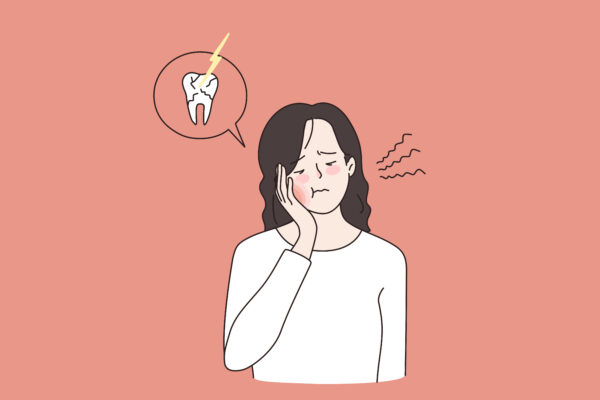Common Causes of Toothaches

At Frontier Family Dental in Powell, Dr. Williams often sees patients dealing with toothaches. Whether you’re experiencing a sharp, sudden pain or a dull, constant throb, it’s important to come visit us right away so that we can discover the origin of your discomfort. Today, we’ll look at a handful of the most common sources of toothaches.
What are Toothaches?
First, it’s helpful to understand what is happening in your tooth. In a nutshell, a toothache is caused when the innermost layer of your tooth (called the pulp) becomes irritated, inflamed, or injured. And because the nerves in our teeth are among the most sensitive in the body, this can lead to some serious pangs of discomfort. Pay attention to what triggers your tooth pain and how long it lasts. This could be an important clue to understanding what is going on.
Cavities
One of the main causes of tooth pain are cavities, aka tooth decay. As the cavity grows, it spreads into the tooth’s pulp and irritates the nerves. This can trigger a toothache or sharp pangs of discomfort, especially after eating or drinking anything hot or cold. Fortunately, Dr. Williams can easily repair any damage caused by the cavity by placing a filling. This will prevent the cavity from expanding any further as well as removing what is irritating the tooth.
Abscessed Tooth
A tooth abscess is essentially a pocket of pus that develops in or around the tooth. There are two main types: periapical abscesses, which are usually at the tip of the root, and periodontal abscesses, which occur in the gums at the side of the tooth root. Abscesses develop due to a variety of reasons, including an untreated cavity. In most cases, we can treat a tooth abscess by draining it and getting rid of the infection. In some cases, though, the tooth may need to be pulled. Leaving a tooth abscess untreated can lead to serious complications, so be sure to reach out as soon as possible if you think you might have one.
Bruxism, aka Grinding or Clenching
This is a common problem caused by a variety of reasons, such as stress or bite issues, and places additional strain on the health of your teeth. If you frequently wake up in the morning with a sore jaw or headache, contact our office right away. You may be grinding your teeth or clenching your jaw at night and need to wear a nightguard while sleeping. Regular grinding quickly wears down tooth enamel, putting you at risk of cracking a tooth or even your teeth becoming shorter.
Damaged Fillings
Fillings create a seal that prevents any food particles or bacteria from entering the pulp of a tooth. That said, even though most fillings last for years, some become loose or damaged due to wear and tear, or habits like teeth grinding. When a filling is compromised, the seal begins to weaken, allowing bacteria to attack the pulp. A weakened filling can also undermine the overall health of your tooth, even leading to a cracked tooth.
Cracked or Fractured Tooth
If you have a tooth crack or break for any reason (such as biting down on something hard), be sure to contact our office right away. Even if it starts off small, a crack will gradually grow larger, causing more and more discomfort, especially when eating. Treating a fractured tooth depends on the size and cause of the break. A small crack can be easily repaired with the placement of a dental crown, while a more serious fracture may require a root canal to fix it.
Gum Disease
While the pain may feel like it’s coming from a tooth, it may be coming from your gum tissue instead. This is because even mild forms of gum disease (like gingivitis) irritate gum tissues. Gingivitis can also cause gum tissue to recede, which creates pockets along the gum line that expose the nerves beneath. How we treat gum disease depends on its severity. Gingivitis can usually be resolved after a deep cleaning. More severe forms of gum disease, such as periodontitis, usually require more serious treatments.
Referred Pain
Or the cause of your toothache may not be dental at all. Referred pain is when a problem in your body causes pain somewhere elsewhere. Common causes of referred pain include certain types of headaches, migraines, or sinus infections. It can even be a sign of nerve disease. In rare cases, a heart attack can cause tooth pain.
Contact Our Office Today
So, if you’ve started to experience toothaches or tooth pain, you should contact our team at Frontier Family Dental right away. We are here to help solve any issues that may threaten your oral health while also repairing your smile.
